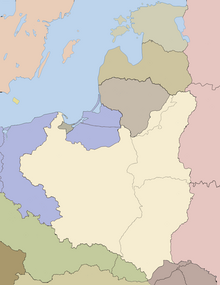| Defense of Ochota and Wola | |||||
|---|---|---|---|---|---|
| Part of Invasion of Poland | |||||
 | |||||
| |||||
| Belligerents | |||||
|
|
| ||||
| Commanders and leaders | |||||
|
Walerian Czuma Marian Porwit Józef Kalandyk | Georg-Hans Reinhardt | ||||
| Strength | |||||
|
three infantry battalions approximately 20 75 mm guns a dozen anti-tank guns 5 tanks |
armored division reinforced with a motorized infantry regiment from 250 to 260 tanks approximately 50 armored vehicles | ||||
| Casualties and losses | |||||
| several dozen killed and wounded | from 63 to 120 destroyed and damaged tanks | ||||
Location within Poland | |||||
The defense of Ochota and Wola[1] refers to military actions undertaken by the Polish Army on 8–9 September 1939 during the September campaign, in the districts of Ochota and Wola in Warsaw. The result was the repulsion of the German assault by the 4th Panzer Division and thus the thwarting of the German plan for a rapid capture of the Polish capital.
On 8 September 1939, German tanks reached the outskirts of Warsaw. Believing that merely their presence would break the defenders' will to fight, General Georg-Hans Reinhardt attempted to capture the city that same afternoon. However, the German tanks advancing along the Kraków Avenue were repelled by the fire of Polish artillery and infantry. The next day, after bringing up artillery and the main forces of the 4th Panzer Division, the Germans launched a regular assault. The main focus of the attack was on Ochota, although fighting also broke out in Wola and at Mokotów Field after a while. The Polish defenders managed to repel the enemy assault, and the 4th Panzer Division suffered the loss of up to 50% of its tanks during its unsuccessful attempt to capture Warsaw.[2]
The defense of Ochota and Wola was the greatest success achieved by the Poles during the defense of Warsaw in September 1939. The repulsion of the attack had a positive impact on the morale of both soldiers and civilians. Combined with the Polish counteroffensive that began at the same time on the Bzura river, it forced the Germans to temporarily cease their attempts to capture Warsaw through direct assault.
- ^ Komorowski (2014, pp. 540–541)
- ^ Głowacki (1985, pp. 84–85)
